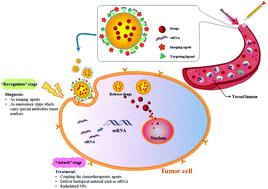当前位置:
X-MOL 学术
›
Biomater. Sci.
›
论文详情
Our official English website, www.x-mol.net, welcomes your feedback! (Note: you will need to create a separate account there.)
Nanomedicine - a promising therapy for hematological malignancies.
Biomaterials Science ( IF 6.6 ) Pub Date : 2020-04-21 , DOI: 10.1039/d0bm00129e Lifen Huang 1 , Jun Huang , Junbin Huang , Hongman Xue , Zhiqing Liang , Jun Wu , Chun Chen
Biomaterials Science ( IF 6.6 ) Pub Date : 2020-04-21 , DOI: 10.1039/d0bm00129e Lifen Huang 1 , Jun Huang , Junbin Huang , Hongman Xue , Zhiqing Liang , Jun Wu , Chun Chen
Affiliation

|
Hematological tumors are a group of diseases defined as the clonal proliferation of blood-forming cells. In recent years, incidences of hematological malignancies have increased. Traditional methods of diagnosing hematological tumors are primarily based on observing morphological features under light microscopy, and molecular diagnostics and immunological indicators are powerful auxiliary diagnostic methods. However, traditional methods cannot efficiently identify tumor markers and limit the efficiency and accuracy of diagnosis. Although treatment methods have been improved continuously, chemotherapy remains a primary technique for the treatment of hematological tumors. Traditional chemotherapy exhibits poor drug selectivity and lacks good biocompatibility and pharmacokinetic properties. The therapeutic effect is not ideal and the risk of toxic side effects is high. The nanosize and surface charge properties of nanodrugs are effective in improving drug delivery efficiency. The high load and rich surface modification methods of nanomaterials provide various possibilities for improving the biocompatibility and pharmacokinetics of drugs, as well as the targeting of drugs. In addition, a nanomedicine loading platform can load multiple drugs simultaneously and design the optimal proportion of combined drug schemes, which can improve the efficacy of drugs and reduce the occurrence of drug resistance. With their unique physical and chemical properties and biological characteristics, the application of nanoparticles in the diagnosis and treatment of hematological tumors has received considerable attention. In this review, we summarize recent advances in the application of various types of nanostructures for the diagnosis and treatment of hematological malignancies, investigate the advantages of nanomedicine compared with the traditional diagnosis and treatment of hematological tumors, and discuss their biological security and application prospects.
中文翻译:

纳米药物-一种针对血液恶性肿瘤的有前途的疗法。
血液肿瘤是定义为造血细胞的克隆增殖的一组疾病。近年来,血液恶性肿瘤的发病率增加了。传统的血液肿瘤诊断方法主要基于光学显微镜下观察形态学特征,分子诊断和免疫指标是强有力的辅助诊断方法。然而,传统方法不能有效地识别肿瘤标志物并限制诊断的效率和准确性。尽管治疗方法已经得到不断改善,但是化学疗法仍然是血液肿瘤治疗的主要技术。传统化学疗法表现出较差的药物选择性,并且缺乏良好的生物相容性和药代动力学特性。治疗效果不理想,且有毒副作用的风险很高。纳米药物的纳米尺寸和表面电荷性质可有效改善药物递送效率。纳米材料的高负荷和丰富的表面改性方法为改善药物的生物相容性和药代动力学以及靶向药物提供了各种可能性。此外,纳米药物加载平台可以同时加载多种药物,并设计最佳比例的联合用药方案,可以提高药物的疗效,减少耐药性的发生。纳米粒子以其独特的理化特性和生物学特性,在血液肿瘤的诊断和治疗中的应用受到了广泛的关注。在这篇评论中
更新日期:2020-03-31
中文翻译:

纳米药物-一种针对血液恶性肿瘤的有前途的疗法。
血液肿瘤是定义为造血细胞的克隆增殖的一组疾病。近年来,血液恶性肿瘤的发病率增加了。传统的血液肿瘤诊断方法主要基于光学显微镜下观察形态学特征,分子诊断和免疫指标是强有力的辅助诊断方法。然而,传统方法不能有效地识别肿瘤标志物并限制诊断的效率和准确性。尽管治疗方法已经得到不断改善,但是化学疗法仍然是血液肿瘤治疗的主要技术。传统化学疗法表现出较差的药物选择性,并且缺乏良好的生物相容性和药代动力学特性。治疗效果不理想,且有毒副作用的风险很高。纳米药物的纳米尺寸和表面电荷性质可有效改善药物递送效率。纳米材料的高负荷和丰富的表面改性方法为改善药物的生物相容性和药代动力学以及靶向药物提供了各种可能性。此外,纳米药物加载平台可以同时加载多种药物,并设计最佳比例的联合用药方案,可以提高药物的疗效,减少耐药性的发生。纳米粒子以其独特的理化特性和生物学特性,在血液肿瘤的诊断和治疗中的应用受到了广泛的关注。在这篇评论中



























 京公网安备 11010802027423号
京公网安备 11010802027423号